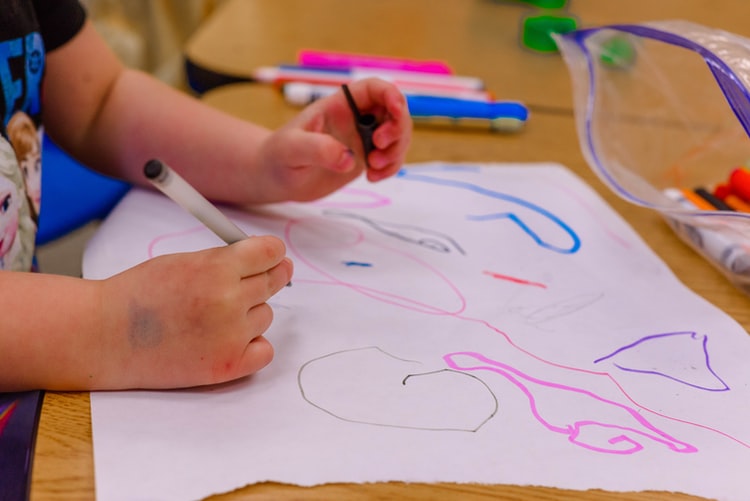
Can preschoolers learn virtually? In a Denver pilot program, some kids ‘can’t wait to log in’ was originally published by Chalkbeat, a nonprofit news organization covering public education. Sign up for their newsletters here: ckbe.at/newsletters
Sara Mohamed and her husband had intended to enroll their 4-year-old son into in-person preschool at Holm Elementary, a nearby Denver public school, but as COVID-19 infection rates soared through the fall in Colorado, they had second thoughts.
They placed their two older children into virtual learning, but struggled to find a district program for their preschooler.
“All summer he’d been excited about going to school in the fall; he was so ready to go,” said Mohamed, of Denver. “He was so disappointed when we eventually told him that he would not be able to go to school in person.”
The family’s saving grace came when a call to Mile High Early Learning, a network of nine subsidized Montessori-inspired learning centers in Denver, confirmed they had space in its virtual preschool pilot program.
The program stems from a partnership between Denver Public Schools and the taxpayer-supported Denver Preschool Program, in response to parent demand. Unlike some other Colorado school districts, Denver Public Schools originally did not offer a virtual preschool option. Administrators there believe strongly that in-person learning is better for the youngest students.
It wasn’t quite the “big boy school” experience Mohamed and her family had envisioned for their energetic little Moumin, but they quickly concluded that any help getting him kindergarten ready was worth a try. Mohamed says weeks into the program her son is flourishing, and they’re grateful to have him enrolled.
“He’s so happy, he loves it,” said Mohammed, who supports new Arabic-speaking families and teaches English classes virtually for Holm Elementary. “It’s only 30 minutes a day, but it’s still made a big difference for him. He can’t wait to log in at 3:30 p.m.”
Mile High Early Learning and the Denver Preschool Program said the pilot appears to be working well for enrolled families.
Mile High Early Learning is among 47 providers that had enrolled in the pilot as of Dec. 3, according to Denver Preschool Program President and CEO Elsa Holguín. Some providers are offering remote learning while some are planning virtual programs in case they have to pivot later in the school year.
Mile High Early Learning students log in Monday through Thursday with program-issued iPads preloaded with learning apps, to join a teacher and more than a dozen classmates for 30 minutes. Families also receive books, paper, crayons, markers, and art supplies. The program asks parents to engage their students outside of class in drawing, painting, writing letters, and even homework.
Holguín says the pilot aims to support early childhood education providers. Since the onset of the pandemic, many said they felt like they were, “flying by the seat of their pants,” with limited guidance and direction.
“We decided that the best thing to do was not just to continue to help out our providers, but also to figure out how to start learning more about how to do [distance learning] at a quality level,” Holguín said.
Denver Preschool Program has underwritten sliding-scale tuition and teacher training and coaching, and provided funding to help sites remain afloat as they navigate the challenges of the pandemic.
Mohamed says she believes the program, especially the tuition support and supplies, is a lifesaver especially for working parents who are leery about risking in-person schooling but also want to ensure their children don’t miss out on critical learning opportunities.
“We were so worried that he might get behind,” she said. “We wanted to make sure that he was ready to go to school next year.”
Occasional technical glitches aside, Mohamed says their program experience has been virtually problem-free. They’ve noticed improvements in Moumin’s attention span. She said he’s grown more focused and engaged with each session he joins with his teacher and classmates.
Rebecca Kantor, a Denver Preschool board member who sits on the task force that is developing the distance learning curriculum, said the group sought to incorporate best practices in early childhood education.
“The two most important things that we know about young children’s learning is that they learn through direct experience and they learn within the context of stable trusting relationships,” said Kantor, dean of the School of Education and Human Development at the University of Colorado Denver. “So, we’re trying to recreate that using tech as a tool and we’re really getting very creative in figuring out a lot of different ways to do that.”
For example, she said one suggested activity entails a student and parent painting together at home, while a teacher discusses with them on screen.
“One of the benefits of doing it that way is that the adult at home is also learning effective conversation skills from the teacher,” she said. “So, there’s a modeling going on that’s really good for the adults, too.”
Mile High Early Learning President and CEO Pamela Harris said along with providing a solid foundation in academics, administrators and teachers in the program have incorporated critical social and emotional learning opportunities.
“Even babies can develop true relationships using technology,” said Harris, who also co-chairs Colorado’s Early Childhood Professional Development Advisory Working Group. “I think it’s the interactivity that is key, having an adult person kind of on both sides, helping the child navigate.” The pilot also provides families resources on a YouTube channel and videos.
The pilot program, which is scheduled to run through the end of this school year, will begin enrolling some 3-year-old programs starting Jan. 4
“We still believe that we need to increase the quality of the distance learning experiences in Colorado,” Holguín said.
Chalkbeat is a nonprofit news site covering educational change in public schools.